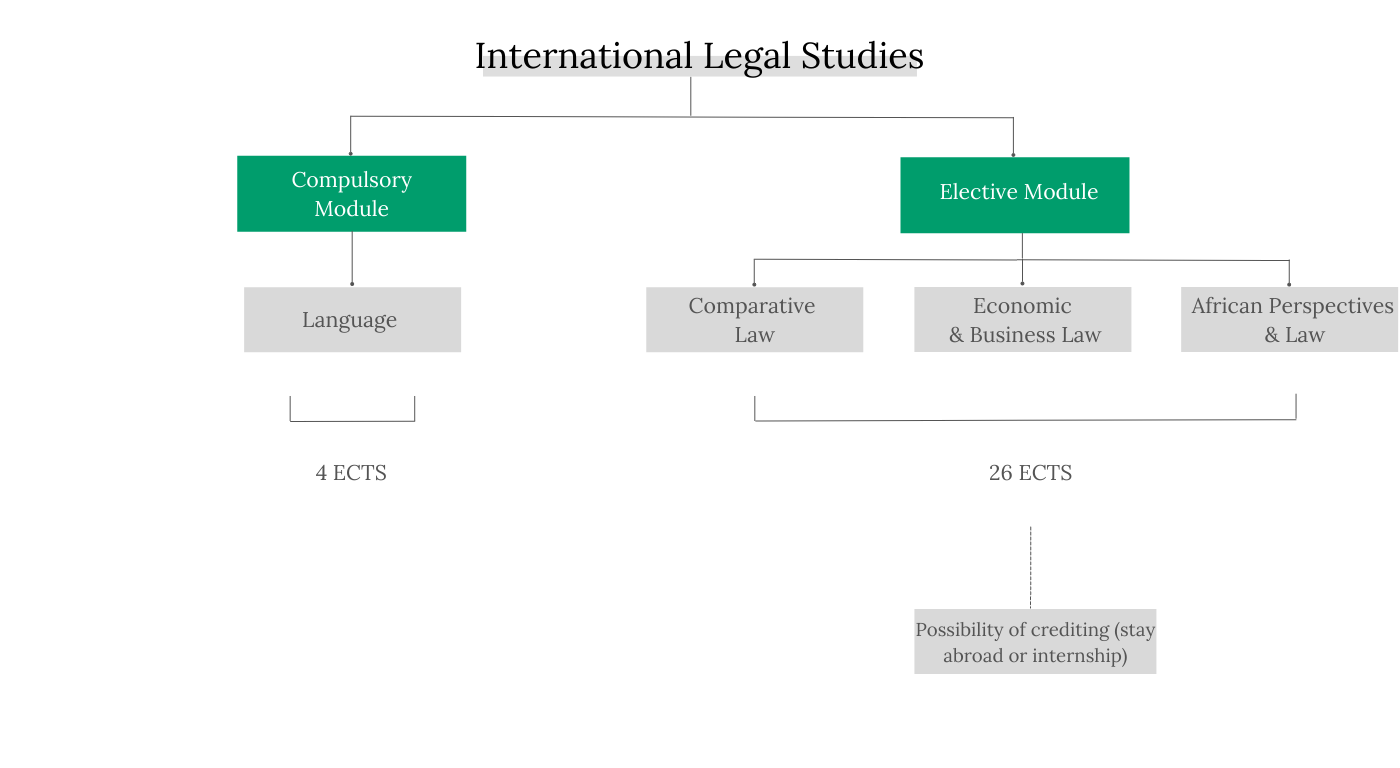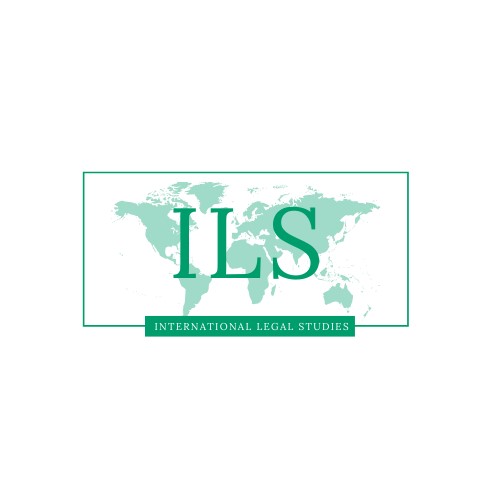Course of study

- Module Area A: LanguageHide
-
Learning Objectives
Objective of this module area is the mediation of subject specific language skills. In the increasingly internationalized sciences the acquaintance with technical terminology is a prerequisite. In the course of this module area the students will learn a repertoire of essential legal terminology that will ensure subject specific conversation and working opportunities outside of Germany and in the international arena.
Learning Content
All courses mediate subject specific English skills applied on legal issues.
Type of Knowledge Transfer
The module area may be completed throughout the entire course of the additional study program.
Participation Requirements
Successful Completion of:
- English for Lawyers 1
- English for Lawyers 2
Performance Report
Students must complete an examination according to the nature of the respective course. Usually this is in the shape of a written exam, the lecturer may determine the type of of examination.
If a students fails to successfully complete the examination the repeat examination must be completed within the course of the additional study program. Examinations will be generated according to § 8 of the examination and study regulations (PSO).
Calculation of the Student Workload
Students are expected to spend 4 hours/week, additionally further weekly hours are anticiapted for exam preparation and written assignments.
Credit Points
The students have to complete 4 ECTS-Points in the module area A: Language.
Frequency of Occurence
The courses will be offered in every semester.
Linkage to Other Module Areas
The module area A: Language must be succesfully completed in combination with module area B/C/D.
- Module Area B: Comparative LawHide
-
Learning Objectives
Objective of this module area is the mediation of fundamental questions, issues and theoretical approaches in comparative law. Students will acquire skills to comprehend, critically assess and compare different legal systems in various geographic regions. Lectures and seminars will offer the students indepth discussions on socio-political discourses beyond the German legal system and introductions into alternative legal systems. This module area is a possibility to translate familiar issues into other geographies and social structures in order to widen the horizon.
Learning Content
The courses mediate (a) academic, theoretical and subject historical foundations, as well as (b) important legal issues, scientific knowledge and basis of comparative law.
Type of Knowledge Transfer
The module area consists of various types of courses, including lectures, tutorials and seminars. Depending on the respective course, the form may vary. Additional information can be found in the module plan and on CampusOnline.
Participation Requirements
Students must be enrolled at the University of Bayreuth in the study program law (Studium Rechtswissenschaften) or the Bachelor of Law (LL.B./Recht und Wirtschaft).
Performance Report
Students must complete an examination according to the nature of the respective course. Usually this is in the form of a written exam, the lecturer may determine the type of examination. Seminars are oftentimes completed with a written assignment.
If students fail to successfully complete the examination the repeat examination must be completed within the course of the additional study program. Examinations will be generated according to § 8 of the examination and study regulations (PSO).
Calculation of Student Workload
Students are expected to spend 12-16 hours/week, additionally further weekly hours are anticipated for exam preparation and written assignments.
Credit Points
Students must complete 26 ECTS-Points in the module area B: Comparative Law.
Frequency of Occurence
The courses will be offered both in the summer and the winter semester, however the frequency of occurence may vary. As some courses have a flexible content-based orientation the students are encouraged to consult the respective study offer at the earliest convenience.
Linkage to other Module Areas
The module area B: Comparative Law must be successfully completed in combination with module area A: Language.
- Module Area C: Economic & Business LawHide
-
Learning Objectives
The objective of this module area is the for students to receive a comprehensive insight into the subject areas of economic and food law. In the courses students will learn fundamental legal terms and statutory structures of economic, trade and transport law, embedded into an international context. Therefore, the students receive the opportunity to analyse issues of globalization and internationalization indepth. When having successfully completed this module area students will be able to apply fundamental economic terms, legal discourses and basic concepts to the international arena.
Learning Content
The courses mediate (a) academic, theoretical and subject historical foundations, as well as (b) important legal issues, scientific knowledge and basis of economic and business law.
Type of Knowledge Transfer
The module area consists of various types of courses, including lectures, tutorials and seminars. Depending on the respective course, the form may vary. Additonal information can be found in the module plan and on CampusOnline.
Participation Requirements
Students must be enrolled at the University of Bayreuth in the study program law (Studium Rechtswissenschaften) or the Bachelor of Law (LL.B./Recht und Wirtschaft).
Performance Report
Students must complete an examination according to the nature of the respective course. Usually this is in the shape of a written exam, the lecturer may determine the type of examination. Seminars are oftentimes completed with a written assignment.
If students fail to successfully complete the examination the repeat examination must be completed within the course of the additional study program. Examinations will be generated according to § 8 of the examination and study regulations (PSO).
Calculation of Student Workload
Students are expected to spend 12-16 hours/week, additionally further weekly hours are anticipated for exam preparation and written assignments.
Credit Points
Students must complete 26 ECTS-Points in the module area C: Economic and Business Law.
Frequency of Occurence
The courses will be offered both in the summer and the winter semester, however the frequency of occurence may vary. As some courses have a flexible content-based orientation the students are encouraged to consult the respective study offer at the earliest convenience.
Linkage to other Module Areas
The module area C: Economic and Business Law must be successfully completed in combination with module area A: Language.
- Module Area D: African Perspectives and LawHide
-
Learning Objectives
Objective of this module area is an interdisciplinary mediation of legal issues in relation to the African continent. Legal foundations will be accompanied by insights into socio-political and historical backgrounds and the question of legal developments on the African continent. Combining courses from sociology, law and political studies offers the students a differentiated analysis of pressing legal and social issues.
Learning Content
The courses mediate (a) academic, theoretical and subject historical foundations, as well as (b) important legal issues, scientific knowledge and basis of African legal systems and African cultures.
Type of Knowledge Transfer
The module area consists of various types of courses, including lectures, tutorials and seminars. Depending on the respective course, the form may vary. Additional information can be found in the module plan and on CampusOnline.
Participation Requirements
Students must be enrolled at the University of Bayreuth in the study program law (Studium Rechtswissenschaften) or the Bachelor of Law (LL.B./Recht und Wirtschaft).
Performance Report
Students must complete an examination according to the nature of the respective course. Usually this is in the shape of a written exam, the lecturer may determine the type of examination. Seminars are oftentimes completed with a written assignment.
If students fail to successfully complete the examination the repeat examination must be completed within the course of the additional study program. Examinations will be generated according to § 8 of the examination and study regulations (PSO).
Calculation of Student Workload
Students are expected to spend 12-16 hours/week, additionally further weekly hours are anticipated for exam preparation and written assignments.
Credit Points
Students must complete 26 ECTS-Points in the module area D: African Perspectives and Law.
Frequency of Occurence
The courses will be offered both in the summer- and the winter semester, however the frequency of occurence may vary. As some courses have a flexible content-based orientation the students are encouraged to consult the respective study offer at the earliest convenience.
Linkage to other Module Areas
The module area D: African Perspectives and Law must be successfully completed in combination with module area A: Language.

